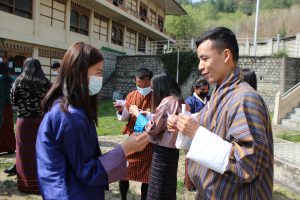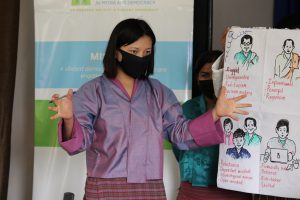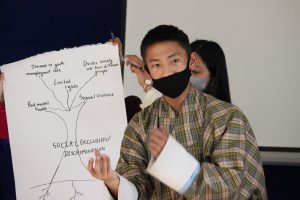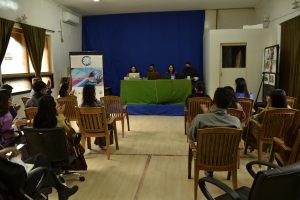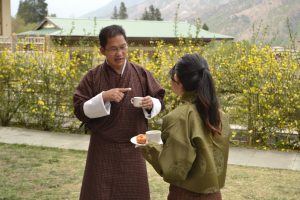April eNews 2021
Youths as Advocates for Change
As the 2021 Youth Initiative (YI) members bid each other farewell till they meet again for the summer camp, Dorji Wangchuk said, “Let me not forget to thank my enthusiastic, energetic, creative, critical and young-blooded friends for making the training and learning so great. It was one of my most memorable weeks with lots of new learning. I realised if we have any plans to make change, we must do so now because the future is now”.
Ugyen Zangmo and Tashi Wangchuk engaged in ‘3 questions mingle’, a team-building exercise.
The week-long YI winter camp which is now running successfully into its eighth year took 24 youths from 12 dzongkhags on an experiential learning journey so that they were able to understand the entire process of advocacy campaigning. Initially, the youths were made to reflect on their experiences of current issues and then invited to share their vision of a proactive, vibrant and conscious society. This approach of self-reflection, plenary-sharing and feedback-reception was utilised for most of the activities throughout the camp.
Tshering Yangden presents their stakeholder profiles to the YI plenary.
The youths also worked in respective groups to build and map stakeholder profiles, where they not only achieved their goals but built teamwork and friendships which are foundational to a successful collaboration. Finally, the members outlined some strategies and possible campaign slogans. During the camp, the alums of YI were also engaged with some of them travelling from as far as Punakha. This is what Sangay Dechen Gyanzo, a member of YI 2020 had to say: “I came all the way here because YI has played a huge role in my life and I know the role that it will play in this cohort’s lives as well”.
Karma Sonam presents their group’s vision where marginalised youths are included in society.
Youth Initiative 2021 was funded by UNICEF and CISU.
Davos Lab Dialogues
The Davos Lab Dialogue builds on the momentum generated from Reset! at The Media Lab conversation series conducted at the end of 2020. The Dialogues provide a space and platform to inspire, empower and connect young people around the world in addressing the COVID-19 pandemic through a grassroots response to shape the future. The Dialogue was carried out in partnership with Global Shapers Thimphu Hub and focused on themes such as Digital Literacy and Future of Politics.
1. Digital Literacy
Views on the current digital consumption and behaviour scenario were discussed which revealed some insights into the lack of awareness on privacy and rights as digital citizens. Speakers also highlighted the need to exercise our responsibility and ethics while generating and consuming information online as citizens. Although policies/legislations can help reduce the incitement of online threats/misuse, individual responsibility is a crucial aspect of digital literacy as well as targeting media literacy programmes to the most vulnerable sections of our population.
Davos Lab dialogue on Digital Literacy.
2. Future of Politics
Some of the suggestions for what the future of politics and future politicians could look like generated some interesting insights; the need to contextualise ourselves within the fourth industrial revolution helped support the need for future politicians to be flexible, open-minded, calculated risk-taker, and be well-versed in the digital realm. A speaker also emphasised that politics should unite people under one umbrella rather than creating divisions: “We are looking forward to a time where people unanimously come together in spirit and action to elect the right candidates and form the right government”.
Another speaker also mentioned that decision-makers must do away with the “Alu Zhoem with no/less experience” mentality because the policies they are making at the moment will affect the youth in the near future. This only mandates the need to have consultations/dialogues between the people including the younger people and their representatives.
Audience members carry the dialogue outside the Media Lab during tea break.
Bhutan After the COVID-19 Crisis
The onset of the COVID-19 pandemic disrupted seemingly every aspect of daily life and has pushed us all to adapt to new ways of living. The pandemic has allowed us to reflect on the limitations of different aspects and sectors of society and given us the opportunity to re-imagine and find directions for a vision for the future.
Therefore, the spring issue of the Druk Journal captures some of the innovative brainstormings and prompts that are being shared with national planners and implementers including the government. Experts, thinkers and decision-makers ask vital questions and brainstorm solutions to help mark the way forward.
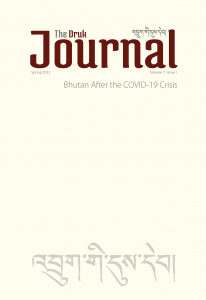
If you’re interested in receiving regular issues of the journal, please subscribe by contacting us at manishakhawas@bcmd.bt
Check out www.drukjournal.bt to stay updated on the journal.
The Great Bhutan Book Drive
Creating Bhutan-centric resources is one of the main programme areas of Bhutan Centre for Media and Democracy. The programme aims to prompt deeper thinking and discussion on media, democracy and citizenship through contextualised contents in multiple formats including documentaries and films.
Organising its second national book drive, VTOB is committed to reaching books to readers who don’t have access to them at home whilst also promoting a culture of book sharing among youths. Having set up 11 Free Open Libraries across the nation, VTOB is looking for book donations to help sustain the libraries.
Sharing a common goal, BCMD is more than happy to help a fellow civil society through donating our publications to support this inspiring initiative by VTOB.
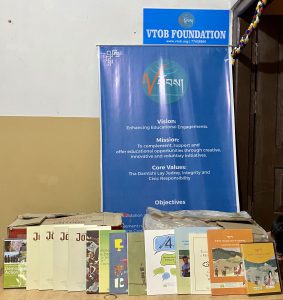
Reaching Out to the Local Government
In what may be deemed first it’s kind, members of the Core Coordination Committee (CCC) of the Civil Society Organisations (CSO) interacted with elected local government leaders from five districts in Punakha organised by EU/Helvetas on 30th April. The objective was to create awareness about civil society works and potentials for collaboration and better coordination between civil society organizations and the local governments.
An evaluation study by Helvetas shows that compared to 2017 public awareness about civil society works has improved over the years. However, constraints exist from both parties. Despite decentralisation policy, local governments operate with the perception that they alone are the sole implementers of development activities and fail to collaborate across sectors including CSOs. Similarly, CSOs remain urban-centric and have limited knowledge of opportunities at the local government for collaboration.
The day ended with the members of the CCC and the local leaders identifying areas, avenues and strategies to collaborate. For many local leaders and administrative officers, this was their first interaction with civil society and were unaware of its existence as an entity supplementing and complementing government’s development efforts.

